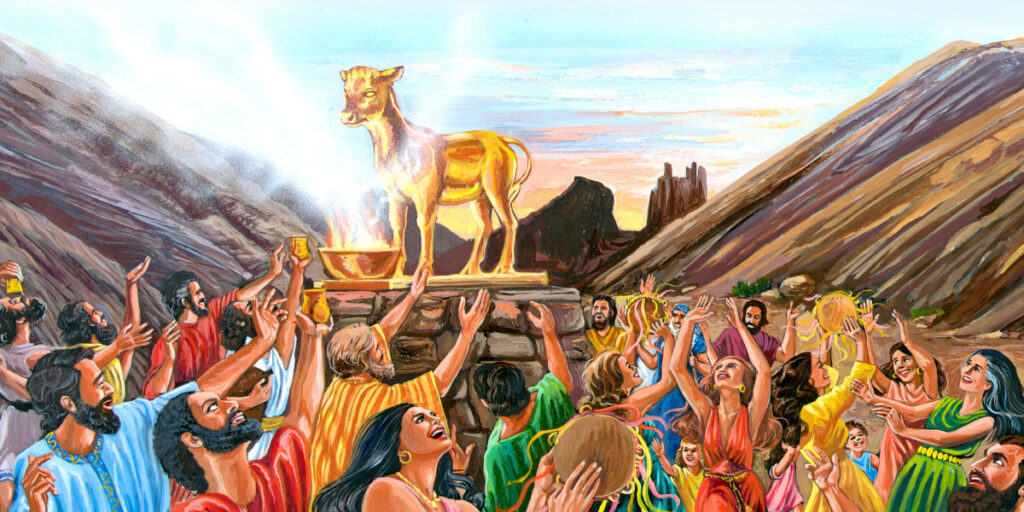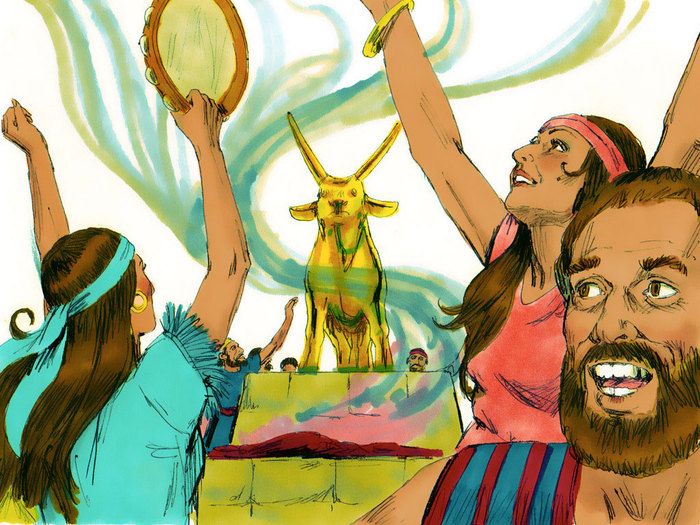
The days of restless wandering began. Each day ended where it began and began where it ended.
They started walking to no destination, day and night, morning and evening. They entered Sinai.
Moses came to the same place where he had spoke to Allah for the first time. He appealed to
Allah for guidance in judging over his people. Allah instructed him to purify himself by fasting for
thirty days, after which he was to go to Mount Sinai, where he would be given the law by which
he would govern his people.
The ancients said that after Moses fasted thirty days, he hated to speak to his Lord because of the
odor of his mouth. He ate a plant of the earth and then his Lord said to him: “Why did you break
your fast?” Moses said: “O my Lord, I disliked to speak to You with my mouth not having a
pleasant smell.” Allah said: “Do you not know, Moses, the odor of the faster’s mouth is more
fragrant to Me than the rose. Go back and fast ten days; then come back to Me.” Moses did what
Allah commanded.
Moses Speaks to Allah – Quranic
Almighty Allah declared:
” And We appointed for Moses thirty nights and added to the period ten more, and he completed
them term, appointed by his Lord, of forty nights. And Moses said to his brother Aaron:
“Replace me among my people, act in the Right Way (by ordering the people to obey Allah and
to worship Him Alone) and follow not the way of the Mufsideen (mischief makers).”
And when Moses came the time and place appointed by Us, and his Lord spoke to him, he said:
“O my Lord! Show me (yourself), that I may look upon You.”
Allah said: “You cannot see Me, but look upon the mountain if it stands still in its place then you
shall see Me.” So when his Lord appeared to the mountain, He made it collapse to dust, and
Moses fell down unconscious. Then when he recovered his senses he said: “Glory be to You, I
turn to You in repentance and I am the first of the believers.”
Allah said: “O Moses, I have chosen you above men by My Messages, and by My speaking to
you. So hold that which I have given you and be of the grateful.”
And We wrote for him on the Tablets the lesson to be drawn from all things and the explanation
of all things (and said): “hold unto these with firmness, and enjoin your people to take the better
therein, I shall show you the home of Al Fasiqeen (the rebellious, disobedient to Allah). I shall
turn away from My Ayat (verses from the Quran), those who behave arrogantly on the earth, in a
wrongful manner, and even if they see all the Ayat (proofs, evidences, verses, lessons, signs,
revelations, etc.) they will not believe in them. And if they see the way of righteousness
(monotheism, piety, and good deeds), they will not adopt it as the Way, but if they see the way of
error (polytheism, crimes, and evil deeds), they will adopt that way, that is because they have
rejected Our Ayat (proofs, evidences, verses, lessons, signs, revelations, etc.) and were heedless
to learn a lesson from them. Those who deny Our Ayat (proofs, evidences, verses, lessons, signs, revelations, etc.) and the Meeting in the Hereafter (Day of Resurrection), vain are their deeds.
Do they expect to be rewarded with anything except what they used to do?” (Ch 7:142-147 Quran)

The Ten Commandments
The Earlier scholars said that The Ten Commandments of the Torah are included in two verses of
the Quran.
“Say: “Come, I will recite what your Lord has prohibited you from: Join not anything in worship
with Him; be good and dutiful to your parents; kill not your children because of poverty- We
provide sustenance for you and for them; come not near to shameful sins (illegal sexual
intercourse, etc.) whether committed openly or secretly; and kill not anyone whom Allah has
forbidden, except for a just cause (according to Islamic law).
This He has commanded you that you may understand. And come not near to the orphan’s property, except to improve it, until he or she attains the age of full strength; and give full measure and full weight with justice.
We burden not any person but that which he can bear. And whenever you give your word (judge
between men or give evidences, etc.) , say the truth even if a near relative is concerned, and
fulfill the Covenant of Allah. This He commands you, that you may remember.” (Ch 6:151-152
Quran).
The Story of Golden Calf – Moses’ People Turn to Idolatry

Moses (pbuh) had been gone for forty days and his people were becoming restless, for they did
not know that Allah had extended his time by a further ten days. Samiri, a man who was inclined
towards evil, suggested that they find themselves another guide, as Moses had broken his
promise. He said to them: “In order to find true guidance, you need a god, and I shall provide one
for you.”
So he collected all their gold jewelry, dug a hole in which he placed the lot, and lit a huge fire to
melt it down. During the casting, he threw a handful of dust, making actions like a magician’s to
impress the ignorant. From the molten metal he fashioned a golden calf. It was hollow, and the
wind passing through it produced a sound. Since superstition was imbedded in their past, they
quickly linked the strange sound to something supernatural, as if it were a living god. Some of
them accept the golden calf as their god.
Aaron Tries to Reason with the Idolaters
Moses’s brother Aaron (pbuh), who acted as their leader in Moses’ s absence, was grieved and
spoke up: “O my people! You have been deceived. Your Lord is the Most Beneficent. Follow and
obey me.”
They replied: “We shall stop worshipping this god only if Moses returns.”
Those who had remained steadfast in belief separated themselves from the pagans.
Moses Sees the Idolaters
On his return Moses saw his people singing and dancing around the calf statue. Furious at their
paganistic ritual, he flung down the Tablet of the Law he was carrying for them. He tugged
Aaron’s beard and his hair, crying: “What held you back when you saw them going astray? Whey
did you not fight this corruption?”
Aaron replied: “O son of my mother, let go of my beard! The fold considered me weak and were
about to kill me. So make not the enemies rejoice over me, nor put me among the people who are
wrong-doers.”
Moses’ s anger began to subside when he understood Aaron’s helplessness, and he began to handle
the situation calmly and wisely.
Almighty Allah narrated:
“They said: “We broke not the promise to you, of our own will, but we were made to carry the
weight of the ornaments of the Pharaoh’s people, then we cast them into the fire, and that was
what As-Samiri suggested.”
Then he took out of the fire, for them a statue of a calf which seemed to low. They said: “This is
your ilah (god), and the ilah (god) of Moses, but Moses has forgotten (his god).”
Did they not see that it could not return them a word (for answer), and that it had no power
either to harm them or to do them good?
And Aaron indeed had said to them beforehand: “O my people! You are being tried in this, and
verily, your Lord is Allah the Most Beneficent, so follow me and obey my order.”
They said: “We will not stop worshipping it (the calf) until Moses returns to us.” (Ch 20:87-91
Quran)
The Conversation Between Allah and Moses – Quranic
Allah the Exalted revealed some of the dialogue that took place between Him and Moses on
Mount Sinai:
“And what made you hasten from your people, O Moses?”
He said: “They are close on my footsteps, and I hastened to You, O my Lord! That you might be
pleased.”
Allah said: “Verily! We have tried your people in your absence, and As-Samiri has led them
astray.”
Then Moses returned to his people in a state of anger and sorrow. He said: “O my people! Did
not your Lord promise you a fair promise? Did then the promise seem to you long in coming? Or
did you desire the Wrath should descend from your Lord on you, so you broke your promise to
me (disbelieving in Allah and worshipping the calf)?” (Ch 20: 83-86 Quran)
Moses Sees the Idolators – Quranic
Allah the Exalted revealed what happened further on Moses’s return:
“Moses said: “O Aaron! What stopped you when you saw them going astray, that you followed
me not (according to my advice to you)? Have you then disobeyed my order?”
He (Aaron) said; “O my son of my mother! Seize me not by my beard, nor by my head! Verily, I
feared lest you should say: ‘You have caused a division among the children of Israel, and you
have not respected my word!'”
(Moses) said: “And what is the matter with you, O Samiri? (why did you do so?)”
Samiri said: “I saw what you saw not, so I took a handful of dust from the hoof print of the
Messenger (Gabriel’s horse) and threw it (into the fire in which were put the ornaments of the
Pharaoh’s people, or into the calf). Thus my inner-self suggested to me.”
Moses said: “Then go away! And verily, your punishment in this life will be that you will say:
‘Touch me not’ (you will live alone exiled away from mankind); and verily (for a future torment),
you have a promise that will not fail. And look at your ilah (god), to which you have been
devoted. We will certainly burn it, and scatter its particles in the sea.” (Ch 20:83-98 Quran)
The Idolaters’ Punishment
However, the punishment which was imposed upon the calf worshippers was severe, death.
“Remember when Moses said to his people: “O my people! Verily, you have wronged yourselves
by worshipping the calf. So turn in repentance to your Creator and kill yourselves (the innocent
kill the wrong doers among you), that will be better for you in the Sight of your Creator.” Then
He accepted your repentance. Truly, He is the One Who accepts repentance, the Most Merciful.
(Ch 2:54 Quran)
Therefore, the crime of worshipping the calf did not pass unpunished. Moses commanded the elite
of the children of Israel to pray to Allah for forgiveness and demonstrate their repentance. He
chose seventy en out of them and ordered them: “Rush towards Allah and repent for what you did
and ask His forgiveness for what you left.”
for scientific miracles articles visit www.sunofislam.com
https://www.youtube.com/channel/UCfj9z
